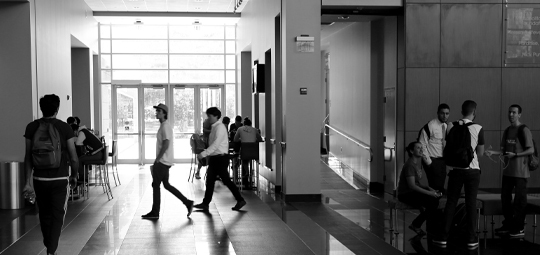Changing minds about b-school requires understanding and addressing concerns. Apply these four career-related insights to turn potentials into students.

As anyone on the recruitment frontlines is aware, changing the minds of undergraduates unconvinced that graduate school is right for them is challenging. However, by understanding the thinking behind undergraduate objections and the information sources they consult throughout their decision-making journey, universities can turn their knowledge into influence.
Findings from the recent GMAC Undergraduate Survey offer actionable advice on how to overcome this recruitment hurdle and convert doubters into graduate school believers.
Understand and address the ‘why’ behind the ‘no’
Before universities get too far down the path of persuasion, it is beneficial for them to take a step back and understand why undergraduates are uninterested in or uncertain about graduate school in the first place.
Survey findings indicate that objections range from the belief that a graduate degree is not needed for their career or to get a job (31%) to students being tired of studying (29%), unsure of options and best-fit programs (16%), family responsibilities (15%), a dislike of standardized testing (12%), and a fear of failure (12%).
However, the number one reason undergraduates say “no thank you” or “I don’t know” to graduate school is due to money (46%). Breaking this down, 27% of undergraduates are uncertain about or uninterested in graduate school because they believe it is too expensive (a value play), 11% say that they cannot afford it (a financing issue) and 8% reference both as reasons not to undertake graduate study.
As was discussed in the previous article, there are many ways business schools can help undergraduates overcome the cost and affordability hurdles. For schools looking to address all objections, undergraduates indicated these four will have the greatest impact:
- Evidence that graduate school would make their career progress faster (42%)
- Learning about career options available because of further studies (33%)
- Insight into how employers view candidates with advanced qualifications (30%)
- Understanding what skills they could learn (28%)
Given that the most frequently cited items that can help change minds are all themed around career benefit, what can schools do?
- Audit marketing materials to identify how they address the four themes identified above
- Review if and how employment and outcome statistics are shared
- Consider including employer testimonials that explain why they hire your graduates and the impact they have on their business
- When describing the curriculum, translate what will be studied into the skills students will gain and how that relates to the job market
- Profile recent or mid-career graduates to address the four themes
Irrespective of the reason undergraduates reject graduate school, universities must address hesitations head-on across their marketing channels and throughout communications and engagements with each unique non-believer group. The university website is a great place to start.
Prioritize the university’s website
Nearly three-quarters of undergraduates (73%) turn to university websites for information about graduate study options, making it the number one consulted source. And, considering that these findings were collected prior to the COVID-19 pandemic, it’s likely that candidate dependence on this channel is even higher than stated.
Considering the popularity of this channel among candidates, universities should use it (along with other channels) to control the graduate school narrative and help candidates overcome their hesitations. As recommended in a previous GMAC Advisor post, now is the perfect time for universities to scrutinize their website through the lens of a student and get qualitative feedback through online focus groups and website audits.
Hone influencer strategies with regional insights
While your website is an important channel, especially now when many in-person engagements and channels are on hold, recruitment strategies involving people are not a thing of the past.
Yes, undergraduates that are uninterested in or uncertain about graduate school are less likely to consult outside people about graduate school than those interested in continuing their education. However, they still rely on people in their lives for information—most often their family, partner, and/or friends (85%). And with many undergraduates moving back home to wait the COVID-19 storm out, they are likely reconnecting with family and friends on a more regular basis.
That said, beyond family and friends, the survey revealed key regional differences that universities should consider (and incorporate) in their influencer strategies. For example:
- North Americans tend to talk to more people than other regions--on average 4.5 vs 2.8-3.5 for other citizenship groups--making it important for universities to leverage students’ family and friends, but also a range of other influencers like fellow students, people in the careers students want, professors, alumni, academic advisors, and more.
- Europeans (46%) and Americans (44%) are more likely to trust their fellow students than any other region (25% to 28%), highlighting that universities should consider peer-to-peer recruitment initiatives.
- African and Middle Eastern undergraduates, alongside North Americans, value the opinions of authority figures more than other regions (70% and 77% respectively), making it critical for universities to engage influencers like academic advisors, professors, career counselors, and people in the careers students want.
- Undergraduates from the Indian subcontinent are the least likely of any region to consult people other than their parents and family, but more likely than other regions to consult alumni (16%) and career counselors (21%). Universities should leverage students’ family and friends, but also appeal to the ROI and employability focus of these students through alumni and career counselor channels.
- Undergraduates from Greater China follow similar trends to those from the Indian subcontinent, except they do not consult career counselors as often (9% versus 21%). Considering the similarities of these regions, universities can gain marketing efficiencies by utilizing similar tactics and campaigns across the regions and adapting them to the appropriate language and cultures.
- Undergraduates with parents born in a different country than them make up over a quarter (26%) of respondents that are uncertain or uninterested in graduate school, making these parents an important segment for universities to consider with parent-to-parent and parent-to-student recruitment efforts.
Build believers now and from the beginning
As the GMAC Undergraduate Survey reveals, there are many opportunities universities can gain from understanding undergraduate thinking and the information sources they consult throughout their decision-making journey, including better:
- Solutions: By understanding why candidates say ‘no’ to graduate school, universities can ensure they provide the right message to the right people at the right time.
- Channel prioritization: There are a variety of sources undergraduates consult for information about graduate school options, but the university’s website remains the largest opportunity for universities to optimize.
- Influencer strategies: Above all other people, undergraduates rely on their family and friends for information on graduate school. Universities must leverage these influencers, but in doing so, they must also factor in regional preferences for other influencers like academic advisors, career counselors, other students, and more.
In addition to these opportunities, universities can benefit from planting the seed early with undergraduates about the value and benefits of graduate school. Doing so, builds believers from the beginning and makes it easier for universities to recruit these candidates down the road. Ready to turn non-believers into graduate school believers? Find a GMAC solution that can help.
___________________________________________________________________________
Read more
This article is part of a four-part series.
- Better Market Your Business Master’s Program to Undergraduates (Now and After COVID-19)
- Bachelor to Business Master’s: What Motivates Certain Students to Make the Leap?
- Decoding Money Hesitations: Why Undergraduates Really Say ‘No’ to Graduate School
- How to Turn Non-Believers Into Graduate School Believers
For more on this, and other topics, check out the GMAC Advisor Blog.
